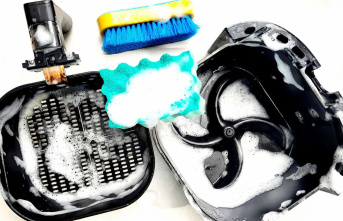Brush your teeth with a manual toothbrush for a few minutes in the morning and evening, and that's it: is dental care that good? It certainly takes a little more for healthy teeth and gums. But what should I pay attention to? Electric toothbrush or is a manual toothbrush sufficient? And do I need dental floss, interdental brushes, or mouthwash? dr medical dr medical dent. Veronika Krehn, doctor and dentist as well as training assistant in the field of oral and maxillofacial surgery in the Hamburg practice Medi-Kiss, gives the star helpful tips for proper dental care.
First of all, it is of course important to know when and how often we should usually brush our teeth. The expert says: “It should be at least twice a day for at least three minutes”. Both in the morning and in the evening "preferably after a meal. Basically, you should wait 30 minutes before brushing your teeth because of the acidity of the food." Regarding the technique, Krehn explains that the bass technique is the right one, "from red to white. That means in circular movements from the gums towards the teeth and not putting any pressure on the gums."
Whether you use a manual toothbrush or an electric or sonic toothbrush depends on a certain factor, says Veronika Krehn: "Manual toothbrushes are good if you master the technique. I recommend one with a soft brush. You have to be careful with electric or sonic toothbrushes , to only guide the brush and not to rub it additionally." A good brush would take care of the rest. In addition, there are now also electric and sonic toothbrushes that can be connected to an app and show how thoroughly cleaning is really done and where there is still room for improvement. In addition, such models also indicate whether too much pressure is being exerted. This can help with dental care.
In addition to brushing your teeth, thorough dental care requires even more: "I recommend interdental hygiene three to five times a week, i.e. dental floss alternately with an interdental brush." Interdental brushes effectively clean the spaces between the teeth and are a useful addition to brushing your teeth. They can even prevent periodontal disease as they effectively remove impurities. The important thing is that you choose the right size and test beforehand which size fits which space. The colors of the brushes indicate their size. Mouthwashes, on the other hand, are not necessarily useful for daily dental care. They are often too aggressive for the oral mucosa. The dentist's tip: "It's better to occasionally rinse with chamomile or sage tea."
In addition to brushing your teeth and interdental care at home, it is also advisable to have your teeth professionally cleaned on a regular basis. "At least twice a year," advises Veronika Krehn. If there is increased tartar formation, it is even advisable to have your teeth professionally cleaned at the dentist several times a year.
If you want to avoid discoloration and prevent the teeth or tooth enamel from being attacked after eating, you can also use sugar-free chewing gum in between. "Either wait 30 minutes after eating and then brush your teeth as well, or chew sugar-free gum for a maximum of five minutes, which neutralizes the food," says Krehn.
Another tip from the dentist: start dental care early. "It is important that you brush your teeth regularly, even with small children, so that the children get used to it. As soon as they can brush their own teeth, you have to pay attention to technology," she explains. And then it's time to keep at it.
This article contains so-called affiliate links. There is more information here.












